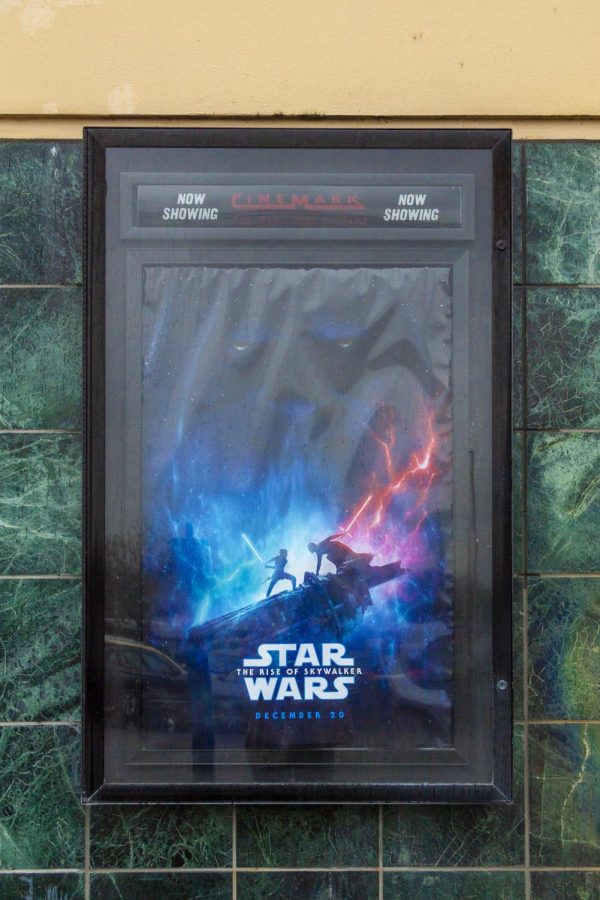Star Wars Episode IX Is a Disappointment, but Enjoyable Nonetheless
The Rise of Skywalker moves at a mile a minute, barely giving the audience time to breathe as it rushes towards the end credits.
January 8, 2020
On December 22, I walked into the neighborhood theater where I had seen every Star Wars release since 2015 to see the ninth and final installment of a series that was born in 1977.
As I had been unable to see it on opening night, I had been religiously avoiding spoilers and reviews for the movie in order to keep my expectations high. I didn’t want a disappointment. I wanted to be blown away.
And I was – but not really. The Star Wars fanboy inside me was overjoyed by what played out on the screen, but in immediate and painful retrospect, the movie I enjoyed so much was not what it could and should have been.
Star Wars Episode IX: The Rise of Skywalker succeeds as an entertaining spectacle and a triumphant conclusion to the forty-year-old saga, but the film is ultimately bogged down by poor pacing, played-out plot elements, and a frustrating lack of cohesion with the first two installments of the trilogy.
This review will not contain any plot points or specific spoilers from Star Wars: The Rise of Skywalker. However, if you’re planning on seeing the movie, proceed with caution, as this article does discuss the overall quality of the movie and may keep you from going in with an open mind.
Episode IX: The Rise of Skywalker serves the dual purpose of being the concluding chapter of both the Sequel Trilogy (episodes seven through nine) and the overarching ‘Skywalker Saga,’ which tells the story of the Skywalker family across the years and includes all Star Wars cinematic releases except Rogue One and Solo, which are spin-off titles.
The Rise of Skywalker directly follows 2017’s Star Wars Episode VIII: The Last Jedi, which was extremely divisive upon its release. The vast majority of people seemed to either hate it or love it; some decry it as a complete cinematic failure and disservice to the medium of film, while others praise it as a masterpiece that is the best Star Wars installment since 1980.
I was personally in the camp that enjoyed The Last Jedi while also being painfully aware of its numerous problems. I gave it credit for trying something new, so my experience with watching The Rise of Skywalker was soured when I realized how hard the movie was trying to ignore Episode VIII.
If I were to sum up The Rise of Skywalker in two words, those words would be “fan service.” Fan service is when filmmakers stuff their movies with callbacks to past events within the universe where the story takes place, Easter eggs from the extended lore, and references to events that hardcore fans will recognize.
When done well, fan service can make the world shown in the story feel more alive and interconnected (an example is Avengers: Endgame). When done poorly, fan service can cross the line into pandering, and the audience loses their suspension of disbelief (think Suicide Squad or the Fantastic Beasts franchise.)
As a huge Star Wars fan, I personally feel that the fan service in The Rise of Skywalker is mostly harmless. However, one thing that is harder to forgive is bad pacing.
The Rise of Skywalker moves at a mile a minute, barely giving the audience time to breathe as it rushes towards the end credits. It has no choice but to do this, as the core conflict itself has to be almost entirely set up and resolved within the runtime. Watching The Rise of Skywalker reveals a massive problem with the Sequel Trilogy as a whole: there is no cohesive, overarching plot.
Each of the previous Trilogies – those being the Original Trilogy (Episodes IV to VI) and the Prequel Trilogy (Episodes I to III) – told a story that had an end goal in mind. The Originals had to end with the redemption of Darth Vader.
The Prequels had to end with the creation of Darth Vader. This is where the Sequel Trilogy falls short; the three movies are on completely different pages on what they are trying to do.
Part of this is due to the fact that J.J. Abrams (Super 8, Star Trek) directed the opening and closing chapters of the trilogy, while Rian Johnson (Knives Out) helmed the middle installment.
However, when the movie isn’t tripping over its own feet, there are moments of character development that are, quite frankly, incredible. Most notably, Adam Driver’s character Kylo Ren receives a satisfying conclusion to his arc, which is the closest thing that the Sequels have to a consistent throughline.
Having seen Ren’s story play out, I feel very secure in saying that he is one of the best characters in the entirety of Star Wars, and I hope that we get to see more of him, one way or another.
A lesson that The Rise of Skywalker has learned from its immediate predecessors was the use of humor. A common criticism of Episodes VII and IIX was the number of jokes and the poor timing of those jokes.
The Rise of Skywalker largely avoids this problem. The chemistry between the principal characters Rey, Poe, and Finn has also improved from their previous appearances, and the energy of their performances helps to raise this movie at least above the dry and lifeless Prequels.
That energy is why I walked out of the theater with a genuine feeling of ecstasy, overwhelmed by the noise, motion and perceived quality of the movie I had just watched. But after initial high wore off, rose tinted glasses started to smudge, and I began to doubt whether my initial impression of the film was accurate to how good it actually was.
Out of that doubt came clarity, and therein lies the problem with The Rise of Skywalker. After the dust settles and the viewers and critics turn to scrutiny, the film can’t inspire enough suspension of disbelief to keep you starry-eyed for long.






Kyle Voge • Jan 9, 2020 at 2:35 pm
“Rose tinted glasses started to smudge”…
I liked that a lot.
KV
John Cipolla • Jan 9, 2020 at 10:13 am
@Luke Thompson
The only reason I find why people like the new Star Wars movie are enjoyable are because of the nostalgia of the older movies. Take away the nostalgia and you have a pretty dry movie. Another reason I dislike the new movie is because they destroy the Original Trilogy character. Luke a respect character that fans love. The hero of the original trilogy tries to murder their nephew over a force vision. Even though Luke when out of his own safety, tries to bring back his father Darth Vader back to the light side. Can’t talk to Ben over his anger issue but instead has the thought of killing him. Then he dies from a force projection because he didn’t want to show up even though his X-wing in the water just sitting there. I can go on about how Anakin ark is ruined or how Poe and Finn are wasted characters that have good character ideas but had nothing to do. Or how the ability force healing brakes the lore or light space skipping. I understand why it’s disappointing but it’s because of nostalgia for the older movies. I love to talk about more about why it’s the new movie disappointing.
Plus in my opinion is that the worst part of ROSW is you now that Ben and Rey are related.